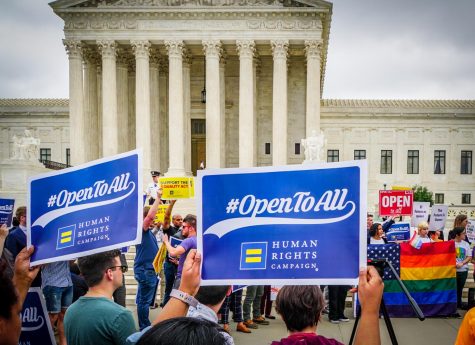Top 8 of 2018: Legal Limelight
January 9, 2019
Always a political battleground, the judicial sphere became especially prevalent in the news this past year. From fiery hearings to long-anticipated verdicts, here are our top 8 legal moments of 2018.
1. Zuckerberg’s Hearing
April 10, 2018 – April 11, 2018
Facebook founder and CEO Mark Zuckerberg testified before the Senate and then the House in a grueling two-day hearing following reports that Facebook sold user data to private company Cambridge Analytica without permission. Questions covered topics ranging from Facebook’s protocols for dealing with private data to its potential role in the opioid crisis.
2. Masterpiece Cakeshop vs. Colorado
June 4, 2018

Protesters outside of the Supreme Court rally in favor of the same-sex couple alleging discrimination against a baker who cited his religion when refusing to make them a wedding cake.
The case began in the lower courts after a Colorado baker refused to make a wedding cake for a same-sex couple on the grounds of religious freedom. Diverging from the decisions of the lower courts, the Supreme Court ruled 7-2 to acquit the baker of discrimination, citing the Colorado Rights Commission’s hostile conduct toward the baker and his religious views during the initial investigation into the couple’s allegations. However, the Court specified that this particular verdict was reached based on the specific details of this case and the state’s treatment of the baker; it did not stand as a referendum on the ongoing debate between religious freedom and equal rights. This caveat led both sides to claim a degree of victory in the aftermath, but the narrow scope of the ruling suggests that the Supreme Court may need to take a more definitive stance on the issue in a future case.
3. Data Privacy Ruling
June 22, 2018
In a major victory for advocates of personal privacy and the Fourth Amendment, the Supreme Court ruled that law enforcement requires a warrant to obtain cell phone records as part of an investigation in most cases. Such phone records can contain data vital to an investigation but highly personal to a user, such as location history. This decision guarantees an individual the right to privacy even when their data is owned by a third-party company, a departure from previous Fourth Amendment verdicts.
4. Travel Ban Upheld
June 26, 2018
In a 5-4 decision that overturned those of lower-level federal courts, the Supreme Court ruled to uphold the latest version of President Trump’s travel ban. The ban restricts travelers from eight countries, most of which are predominantly Muslim, from entering the United States. This decision was particularly noteworthy on a political level, as it highlighted the power to shape public policy enjoyed by the new conservative majority on the bench.
5. Strzok Hearing
July 12, 2018
Former FBI agent Peter Strzok was called to testify before the House in an emotionally-charged hearing that devolved into chaos and numerous arguments. Initially a key member of the investigation into Hillary Clinton’s emails, Strzok became a controversial figure after it was revealed that he sent many anti-Trump texts. Republicans seized on this as an indicator that the investigation into Clinton’s emails, which did not recommend charges against her at its conclusion, was biased in her favor. They also cast doubt on the credibility of the ongoing investigation into possible Russian collusion in the 2016 election, as Strzok was briefly involved with that probe as well.
6. Kavanaugh Confirmation Hearing
Sept. 27, 2018
As part of the Supreme Court confirmation process, then-Judge Brett Kavanaugh testified in front of the Senate Judiciary Committee in a contentious, high-profile hearing viewed on television by more than 20 million Americans. President Trump nominated Kavanaugh to preserve the Republican Party’s 5-4 majority after Justice Anthony Kennedy’s retirement left a vacant seat on the bench. However, the sexual assault allegations leveled against him by Dr. Christine Blasey Ford largely dominated Kavanaugh’s hearing, leaving public opinion of him deeply divided despite his eventual confirmation to the highest court in the land.
7. Dr. Ford’s Testimony
Sept. 27, 2018
Dr. Christine Blasey Ford testified just before Judge Kavanaugh as part of the same hearing, but her appearance before Congress deserves a mention of its own. Her testimony spurred President Trump to order a week-long FBI probe into the allegations against Kavanaugh, delaying the confirmation vote, and inspired many women around the country to report sexual harassment or abuse that they themselves had faced as well. This hearing was also unique in that Republican Senators on the Judiciary Committee hired Arizona sex crimes prosecutor Rachel Mitchell to question Ford on their behalf rather than questioning her directly.
8. Pichai’s Hearing
Dec. 11, 2018
The second tech-giant executive on this list, Google CEO Sundar Pichai was called to testify before the House Judiciary Committee on political bias, privacy, and the effort to expand Google in China. Lawmakers were especially interested in whether Google’s search engine discriminates against conservative viewpoints, a common Republican claim over the past year which Pichai denied during the hearing.





